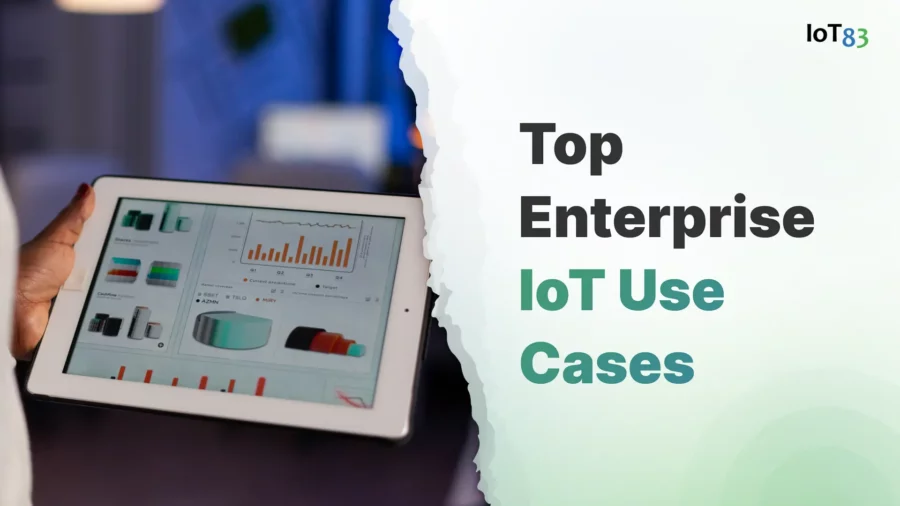
Enterprise IoT has become strategically imperative for manufacturing businesses. As per the latest report by Business Research Company, the industrial IoT market size proliferated, around $247.96 Billion in 2023, and for sure, it will grow to $292.64 Billion in 2024 at a CAGR of 18%, leading to $538.09 Billion in 2028 at 16.4% CAGR. The growth can be attributed to predictive maintenance, cost efficiency, industry 4.0, quality control, supply chain optimization, edge computing, AI and ML, customization and personalization, sustainability, cyber security, remote monitoring and control, and more. OEMs are now well aware of the value of enterprise IoT, from operational excellence to the preservation of invested capital across multiple dimensions.
That’s why more and more organizations are leveraging enterprise IoT technologies to automate challenging operations, provide a safer workplace, and boost productivity.
Importance of Enterprise IoT for Industrial OEMs
The pressure to deliver smart products and fulfill user demands led OEMs towards enterprise-grade IoT adoption. Here are a few key reasons why OEMs choose the enterprise IoT (Internet of Things):
- Collect and process heavy system data without having any negative impact or pressure on the device’s performance.
- Leverage fast and more accessible global communication with enterprise IoT technology. It makes information exchange and collaboration more efficient, regardless of where the location of the business or individual.
- Customize business offerings, meet the frequently changing customer demands and interests, deliver superior customer service, and increase overall business value.
4 Enterprise IoT Use Cases for Industrial OEMs
Knowing the importance and use cases of enterprise IoT can help industrial OEMs integrate it into future investment decisions. That is why we set out to create the most comprehensive list of IoT use cases in the manufacturing industry. Here’s a list highlighting the unique features:
1. The Enhancement of Product Performance and Efficiency
With enterprise IoT technology, OEMs get the power to significantly enhance product performance and efficiency by embedding sensors and smart components into products. It allows real-time data collection and analysis, enabling predictive maintenance to foresee potential issues before they occur, minimizing downtime. Also, enterprise IoT can optimize product usage and energy consumption, leading to more sustainable and efficient operations.
For example, in manufacturing, IoT devices can monitor equipment conditions, optimize the maintenance schedule, and reduce energy consumption by adjusting operations based on real-time demand.
2. Operations Optimization and Increase in Revenue Streams
Businesses can achieve greater operational efficiency by automating routine tasks and optimizing resource allocation with enterprise IoT devices. Industrial OEMs can lead to significant cost savings and increased productivity with IoT optimization, making the most out of the insights collected through IoT applications. They can leverage new revenue streams by enabling the business model transition such as equipment-as-a-service.
For instance, an OEM could use IoT edge data to offer personalized services or subscriptions based on usage patterns, creating a more tailored and valuable offering for customers.
3. Creating a Significant Competitive Edge and Value Chain Elevations
The enterprise IoT technology can provide OEMs with a competitive advantage by enhancing the value they deliver to customers. Through the detailed insights gained from IoT data, industrial OEMs can improve their supply chain management, reduce downtimes, and enhance customer satisfaction with better product quality and service. This elevation of the value chain not only strengthens a company’s position in the market but also sets new standards for competitors.
4. Integration of IT/OT/BT for Automation and Intelligence
Enterprise IoT facilitates a seamless flow of information across different layers of an organizational structure, incorporating Information Technology (IT), Operational Technology (OT), and Business Technology (BT). It enables automated decision-making and intelligent operations to identify patterns with data analytics and machine learning algorithms, predict outcomes, and suggest optimal actions. Such a level of automation and intelligence can significantly improve efficiency, productivity, and agility.
What it Takes to Make it Happen
Enterprise IoT has a position as a transformative force with its ability to enhance product performance, optimize operations, gain a competitive edge, and integrate IT/OT/BT. Industrial OEMs can choose an Enterprise Domain Cloud-based solution to overcome all the obstacles on their way to successful business transformation. OEDC can help industrial OEMs gain a competitive edge to elevate and extend their value chain across multiple industry verticals.
However, the journey to IIoT adoption has its challenges like uncontrolled development costs, operational risks, time to market, integration complexity, vendor dependency, and product life cycle management requires careful planning for short-term and strategic long-term success.
Here, an OEM Enterprise Domain Cloud (OEDC) comes as the best alternative with buy and build approach, providing a platform for the rapid development of industrial IoT smart applications to establish a reliable system for a more efficient, productive, and sustainable business. Industrial OEMs can kick start their transformation journey from 83% progress as OEDC brings with it a set of pre-built microservices on top of which application logic can be developed as per the customized business need.
Conclusion
Enterprise IoT use cases span across manufacturing industry verticals, demonstrating the transformative power of IoT technology in driving efficiency, enhancing productivity, and fostering new-age innovations. It is revolutionizing traditional business models and operational processes to optimize operations, create newer revenue streams, and improve customer experience by leveraging real-time data analytics, automation, and connectivity.
However, it requires a capable enterprise domain cloud in order to overcome challenges like data security, mesh network demands, and latency issues to enable worry-free business transformation.
Hence, enterprise IoT is the innovation to power the future of business operations, underlining the importance of strategic implementation and continuous innovation.
Would you like to understand this further? Speak to the experts.

Akhil Arora, VP Sales at IoT83
Akhil, the VP of Sales at IoT83, brings a wealth of experience in financial and business solutions, fostering a results-oriented approach. Renowned for his ability to pinpoint digital gaps, Akhil guides operational and product management teams toward competitive advantages in Industrial IoT Asset Performance Management Solutions.
His expertise lies in crafting transformative digital journeys, ensuring clients experience substantial and lasting value creation. Akhil’s strategic vision significantly contributes to the continued success of IoT83’s sales endeavors.

